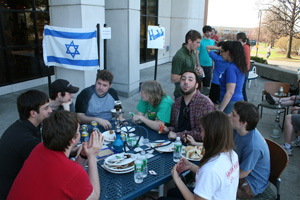For the first time in five years, Ithaca College celebrated Yom Ha’atzmaut, Israel’s Independence Day, with crafts, music, food, hookahs and educational materials Sunday in IC Square.

“I’m just here for the delicious kosher food,” said senior Elyssa Kolber. “No, I’m just kidding. I love the country … . The Israeli culture is beautiful. The country is more than just political news. When I think of the country, I think of all the fun and enjoyment I feel when I’m there.”
The state of Israel is still young — only 59 years old Monday. But the area has a lot of history and the land debate with Arabs still continues.
Michael Faber, director of Hillel and campus rabbi, said the holiday was not a political event.
“It’s not a time to debate, but a time to celebrate,” he said.
In the Balfour Declaration of 1917, the British government supported a Jewish “national home” in Palestine, with the condition that nothing should be done which might prejudice the rights of existing communities there.
In 1947, the United Nations General Assembly approved a partition plan dividing the territory into two states, with the Jewish area consisting of roughly 55 percent of the land, and the Arab area consisting of roughly 45 percent. David Ben-Gurion, leader of the Zionist movement to create a Jewish state, accepted the proposal, while the Arab League did not.
The Arab Higher Committee ordered a three-day military strike on Jewish buildings and neighborhoods. The attacks turned into widespread fighting between Arabs and Jews, beginning the 1948 Arab–Israeli War.
The Declaration of Independence of the State of Israel was publicly read in Tel Aviv on May 14, 1948, before the expiration of the British Mandate of Palestine. The expiration would have meant no boundaries — just Jews and Arabs living together. Following the State of Israel’s declaration, Egypt, Iraq, Jordan, Syria and Lebanon declared war on Israel and began the second phase of the war. After months of war, a cease-fire was declared in 1949 and temporary borders, known as the Green Line, were instituted. Israel had gained 23.5 percent of the Mandate territory west of the Jordan River. Israel was admitted as a member of the United Nations on May 11, 1949.
“Israel is very important to me,” Faber said. “Even though I am located far away … physically, it is very close to me, and I’m a true Zionist.”
Hillel and the Student Alliance for Israel (SAFI) sponsored Sunday’s event, which attracted about 450 people. SAFI is an organization established this year that has planned a series of programs for April to make the month Israel Awareness Month. They are waiting to hear from the Student Government Association about funding the event, Faber said. The Jewish Studies program, which has co-sponsored events with Hillel in the past, chose not to sponsor the celebration because their program is academically focused, said Rebecca Lesses, co-chair of Jewish Studies.
“The Independence Day is inherently political, like any country’s independence day,” she said. “We’re not in the business of making political stances. We see our goal as to educate students, not to tell them what to think.”
Senior Jonathan Gillerman, vice president of SAFI, said the holiday is important to him because it is the only Jewish country in the world.
“Yom Ha’atzmaut represents more than a nation’s declaration of sovereignty. It represents the struggle of the Jewish people,” he said. “After nearly 2,000 years of being exiled from their lands and hundreds of years of victimization in Europe, this event frees us from being the victim, transforming us into the victor.”
Sophomore Revi Roza, a guitarist and singer for The Rozatones, one of the bands to perform during the event, has been to Israel many times.
“A lot of people are misinformed about the country, and I hope this event helps people see the beauty of the country,” she said.







